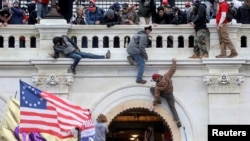For China's propaganda machine, the storming of the U.S. Capitol by a mob fit neatly into Beijing's anti-American narrative as an example of democracy in decline.
But experts told VOA Mandarin that the approach could backfire on China by showing the strength of a U.S. system that allows for the peaceful transfer of power and an investigation conducted according to the rule of law.
China's ruling party-controlled Global Times newspaper published an article titled "Model Democracy Withering, America Unable to Repair Its Image after Capitol Riot," in which it said the U.S. Electoral College is an outdated system unable to meet the challenges of modern democracy.
Feng Chongyi, a professor of contemporary China studies at Australia's University of Technology Sydney, told VOA Mandarin that the Chinese Communist Party has been engaged in an ideological war with liberal Western democracies for years, so it is unsurprising that Beijing is spotlighting the problems in American society bared by the January 6 incident.
Yet the approach may boomerang because "even a major incident such as the Capitol riot cannot stop the peaceful transfer of power," said Feng. "That showcased how multiparty politics and democracy could correct itself. So this is a perspective that threatens the CCP's rule."
Discussions and op-eds about the Electoral College have proliferated in the U.S. media since the 2016 election in which Democrat Hillary Clinton won the popular vote but Republican Donald Trump won in the Electoral College to become president. What is new is Beijing's disparagement of the institution coupled with a robust effort to depict U.S. democracy in decline after the January 6 riot.
Five people died in the attack, including a Capitol Police officer. Former President Donald Trump is facing an impeachment trial in the Senate on charges of inciting an insurrection of his supporters to prevent the certification of President Joe Biden's election. The FBI has charged more than 150 rioters and is investigating hundreds more, including several active law enforcement officers.
The police force charged with protecting the Capitol acknowledged Tuesday that it knew there was "strong potential for violence" but failed to take necessary steps to prevent what the acting chief of the Capitol Police, Yogananda Pittman, described as a "terrorist attack," according to the New York Times.
June Dreyer, a professor of political science at the University of Miami who is an expert on China, echoed Feng, telling VOA that the current propaganda campaign may inadvertently reveal the strength of U.S. democracy.
"Certainly nobody that I know in the United States thinks that this chaos has been a good thing," she said. "But if you look on the bright side, people in countries with autocratic governments like Russia and China, among many others, can see that there have been no mass arrests. The police don't kill people."
Dreyer added, "But in China, people know that even lawyers who tried to defend people have had their licenses suspended. So you can't even get a lawyer to defend you. And I think that if people look carefully at what happened in the United States, they will see that democracy is actually pretty resilient."
George Magnus, author of "Red Flags: Why Xi's China is in Jeopardy," and an associate at Oxford University's China Center, agreed with that view.
"If China makes a lot of noise about the crisis of American democracy and it turns out that it's not such a crisis as they say, then the credibility of the Chinese government in other countries could be undermined," he said.
Feng also said the January 6 assault showed how seriously the U.S. military takes its oath to defend the Constitution and the American people.
When Trump refused to acknowledge that Biden had won the election, General Mark Milley, chairman of the Joint Chiefs of Staff, assured the public there would be no politicization of the military even as concern grew over what Trump might do to remain in office.
"We do not take an oath to an individual," Milley said days after the November 3 vote at the opening of the National Museum of the United States Army.
"We take an oath to the Constitution … and each of us will protect and defend that document regardless of personal price."
Feng said the separation of the military from politics contrasts sharply with China's system.
"The CCP put forward the concept of military nationalization since the 1980s," he said.
"Fast forward to today, China still requires the military to listen to the Party."
Lin Yang contributed to this report, which originated on VOA Mandarin.




